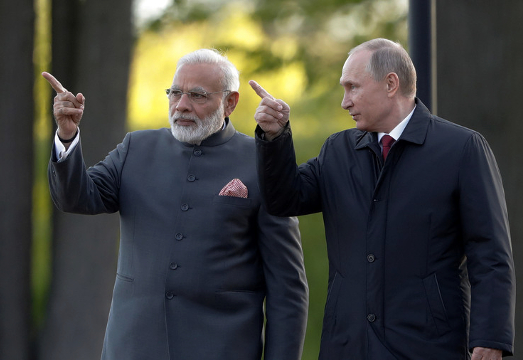To counter US President Donald Trump’s economic sanctions, snap trade wars and the dollar’s dominance in world trade, Russia is nudging Indian policymakers to explore ways to stop depending on the greenback and conduct trade in alternative currencies.
On November 29, two of the Russian Federation’s top economic advisers, Prof. Andrei Spartak and Mikhail Ershov, held a video conference with Prof. Manoj Pant (chairman of the state-run Indian Institute of Foreign Trade) and Prof. Geetanjali Natarajan (a trade expert at the Indian Institute of Public Administration) on options to “de-dollarise” the world economy.
An underlying reason behind the US’s ability to enforce sanctions and its economic agenda on a global scale has to do with the greenback’s pre-eminent status as a currency of choice for international trade. When two countries trade goods or services, they will most likely pay each other in dollars, which are then either changed back into local currency or even held in dollar reserves.
In the two-hour discussion witnessed by this correspondent, the Russians proposed to the Indian side if they could think of moving away from the dollar.
India has signed up for massive military purchases from Russia, including S-400 missiles and warships. The first payments for the Rs 39,000-crore missile deal will be due soon.
“The American economy is overheating and a meltdown like in 2008-09 is quite possible. So we need to be ready with alternatives (to the dollar),” Ershov said. The Russians said “de-dollarisation” was possible.
“Point is international transactions are a function of international economics. Trade is not bilateral anymore. A large part of avionics in Sukhoi comes from Israel. Will Israel accept rupees?” Pant asked. Russian-made Sukhois are India’s top-line fighter jets.
Elementary trade theory suggests currencies with the highest volume of trade and lowest transaction costs are more likely to be chosen as a preferred means for global payments. According to the data portal Statista, the US dollar’s share in global foreign exchange reserves from 2009 to 2017 stood at 64.16%.
Prof. Pant said partly the problem was created by Russia and China, too, which are now in Trump’s crosshairs. “Will China agree to not hold its reserves in dollars?” he asked. “China is not interested in dominating international politics, China wants to dominate international economics,” he said.
The Russian push reflects concerns in the Kremlin over US sanctions. The country has already embarked on a “de-dollarisation” plan. In November, it issued 1 billion euros ($1.13 billion) worth of seven-year bonds. Such treasury bonds would otherwise be issued in dollars.
Spartak heads the committee for economic integration and foreign policy activities at the Chamber of Commerce and Industry of the Russian Federation. Ershov is chief financial research officer of the Russian Institute of Energy and Finance.
“Geopolitics will play a major role for India to decide in favour or against de-dollarisation,” Nataraj said.
Ershov said Russia was not moving away from the dollar so much as the dollar was “moving away from us. He was referring to Trump’s threats to slap new sanctions, freeze Russia’s dollar-denominated assets and also target its sovereign debt.
Source: HT
Image Courtesy:RT.com
You may also like
-
IAF Aircraft Set Course For Exercise Eastern Bridge VII At Oman
-
India-us Working Together In Areas Like Critical Minerals, Supply Chains And Advanced Technologies: Shri Piyush Goyal
-
Defence Secretary to co-chair 5th India-Philippines Joint Defence Cooperation Committee meeting in Manila
-
2nd India-Japan Finance Dialogue held in Tokyo on 6th September, 2024
-
Prime Minister, Shri Narendra Modi welcomes Crown Prince of Abu Dhabi
